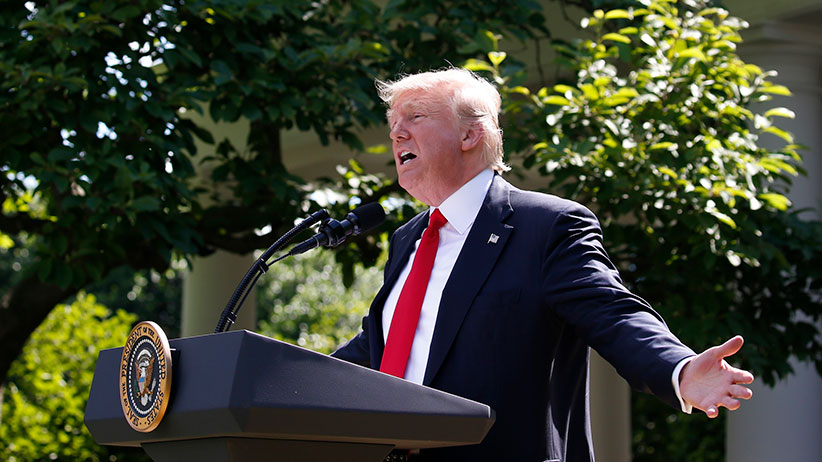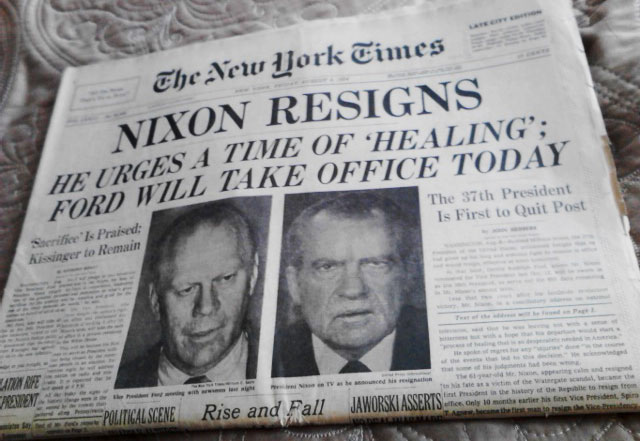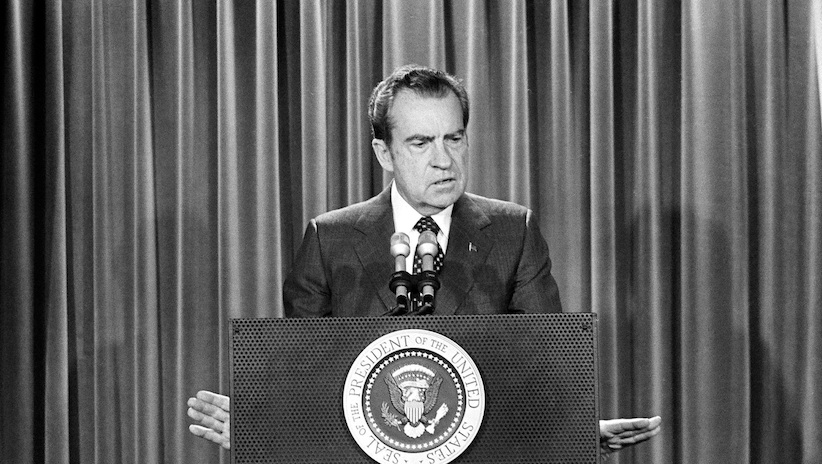Donald Trump’s Watergate moment
Forty-three years after Nixon resigned, Allen Abel goes to Capitol Hill to ask lawmakers: ‘Are we there yet?’
U.S. President Donald Trump announces his decision that the United States will withdraw from the Paris Climate Agreement, in the Rose Garden of the White House in Washington, U.S., June 1, 2017. (Joshua Roberts/Reuters)
Share

One way to attract attention in the United States Capitol is to stand by the basement entrance to the Senate elevators, holding up a copy of The New York Times dated Aug., 9, 1974, the one with the big headline on the front page that says:
NIXON RESIGNS
HE URGES A TIME OF ‘HEALING’
FORD WILL TAKE OFFICE TODAY
“Are we there yet?” a reporter was canvassing this week, brandishing the yellowed broadsheet like a newsboy in knickerbockers, corralling senators as they passed by. It was Watergate season in the American capital, with the 45th anniversary of the bungled break-in at Democratic Party headquarters that would lead to a president’s self-destruction coming up on Saturday.
These same senators, some months from now, may well be called upon to vote on the conviction or exoneration of the current White House occupant. Should this occur—and hundreds of millions of Americans and other Earthlings are hoping desperately that it does—the lawgivers will need to take Watergate and the self-made shame of Richard Milhous Nixon as their guide.
“Are we there yet?”
“Not quite yet,” chuckled Diane Feinstein, Democrat of California, beaming with un-senatorial decorum.
“Are we there yet?” Robert Menendez, Democrat of New Jersey, was asked. (Not to be outdone by the president’s putative high crimes and misdemeanors, Sen. Menendez is facing his own federal trial in September on 14 counts of corruption, bribery and lying to investigators about his dealings with a Florida eye doctor/campaign donor. Menendez has called Trump’s ballyhooed border barricade “a great wall of hate” and blasted him for “terrible and ugly” policies in general.)
“There’s only one guy who can make that happen!” the indicted legislator cheerily cracked.
A chuckling caucus of wide-eyed solons paused to scan the cataclysmic issue, which had been purchased for 15 cents in 1974 and preserved all these years by the reporter’s mother in a carton along with KENNEDY SHOT DEAD and MEN WALK ON MOON.
On the day that Nixon resigned, the only president (so far) to do so, the Times wondered, as millions are musing today of Donald Trump, “How could a public figure who so well perceived the instincts of a majority of his countrymen have misused the powers and duties those same countrymen so eagerly ceded him?”
“By his own description,” the Times continued of Nixon, though this could apply just as easily to Trump, “he was a man of action rather than contemplation, a student of technique who always seemed impatient with substance . . . and who, on reaching his destination, was not always certain what to do when he got there.”
Now, of course, Washington and the wider nation have come again to the same junction, as another president bungles—rather than burgles—himself into the crosshairs of the sharpest legal assassins that public money can buy.
Trump, it was reported last week, is being investigated by special counsel Robert Mueller to determine whether or not he obstructed justice, or if he was merely, as Speaker Paul Ryan lamely mewled, “New at this.”
Trump’s own son-in-law is a target of scrutiny; his vice president has lawyered up. Vice President Mike Pence’s attorney is the godfather of the daughter of James Comey, the FBI domo whom Trump allegedly asked to back off, then angrily canned. So much for draining the swamp.
What is about to ensue here are months, perhaps years, of investigations, accusations, resignations and incriminations as Americans of a certain age relive the events of 1972, 73 and 74. Those dizzy days culminated in August, 1974, when Nixon told the nation that “I have never been a quitter” and then quit, while, the Times reported, “the young women who work in the press office went through the motions of their job with tears streaming down their faces.”
Four decades later, no one in the Capitol basement has been noticed weeping for Trump.
“Are we there yet?” Christopher Coons, Democrat of Delaware, was asked.
He smiled and looked at the headline.
“Steadily closer,” said Senator Coons.

Here is a simplified, one-paragraph primer for those too young to remember, so that you are up to speed should the beautiful wall come crashing down around Donald Trump.
On June 17, 1972, five men broke into offices of the Democratic Party in a complex called “The Watergate” on the Washington riverfront. These “plumbers” and their ringleaders were arrested and copped to being freelance Nixon loyalists of an anti-Castro bent. (Nixon was running for re-election and would carry 49 of the 50 states that November.) The burglars’ alibi soon unraveled and, thanks to diligent reporting by The Washington Post and leaks from an associate director of the FBI who came to be known as “Deep Throat,” it became clear that senior White House aides and Nixon himself had masterminded the burglary, the cover-up, and the firing of the main prosecutor in the case—and that Tricky Dickie had audiotaped the whole sordid thing. After Congressional hearings mesmerized the country, Nixon resigned rather than face certain impeachment and conviction.
“To leave office before my term is completed is opposed to every instinct in my body,” Nixon said as he surrendered. “But I must put the interests of America first.”
The constable who processed the Watergate trespassers that warm June night was a man named John Barrett who, nearly half a century later, was enjoying a beverage in the newly-refurbished Watergate Hotel and saying that “Nixon was paranoid for sure. He didn’t start Watergate, but he wanted to protect his people. He demanded loyalty, and he gave loyalty.”
“That sounds familiar,” a reporter said. (So do the words “America first.”)
Barrett voted for Trump last fall, he said, “because I hated Hillary Clinton. She’s a bigger thief than Donald Trump will ever be. If they want to investigate Trump, fine. As I always say, a city, a town, a country gets the government it deserves. Let’s roll the dice.”
Now retired from the D.C. force, Officer Barrett once served as a technical advisor on the film version of All The President’s Men, which detailed Nixon’s Machiavellian machinations even as he wound down the war in Vietnam, engineered a stunning opening to Communist China, and established the Environmental Protection Agency. Barrett said that he even got to meet Robert Redford and Dustin Hoffman, and that one was a gentleman and the other was a creep, but good taste forbids revealing who was who.
“Nixon was a broken man at the end,” the ex-cop sighed. “I think he did the right thing, but I always felt a certain degree of sympathy for him.” And he went on to retell the story of Nixon spending one of the last nights of his presidency sitting at the piano aboard the presidential yacht Sequoia on the Potomac River, playing God Bless America over and over again while drinking Ballantine’s scotch.
“Do you feel sorry for Trump?” the arresting officer was asked.
“He hasn’t done enough for me to feel sorry for him,” he replied.
Barrett was at the Watergate to take part in a panel discussion about the events of 45 years ago and to help the capital’s elite prepare for the delicious public undressing of a president whom nearly all of them viscerally despise. In attendance was a writer named Thomas Mallon who fictionalized the scandal in a novel entitled Watergate that the Times called “a stealth bulls-eye.”
“I hope it ends soon,” Mallon said of the Trump investigation. “Anything would be better than this. Yes, we will have to have Pence and, yes, we will hate it, but then we will have an election. It’s an old cliché that ‘the cover-up was worse than the crime.’ This will be the case where the crime was worse than the cover-up.”
Novelist Mallon—until recently a registered Republican—called the administration of George W. Bush “an age of poetry and diplomacy” compared to the Trump White House. And he warned that, should Trump not be impeached, “God help us. He will pout his way to glory.”

There is no indication whatsoever that Donald Trump is going to go down easy, if he goes down at all.
“I am being investigated for firing the FBI Director by the man who told me to fire the FBI Director! Witch Hunt,” he tweeted on Friday. And:
“You are witnessing the single greatest WITCH HUNT in American political history—led by some very bad and conflicted people!”
And: “Despite the phony Witch Hunt going on in America, the economic & jobs numbers are great.”
Compare that to a headline from The Washington Post dated July 22, 1973:
NIXON SEES
‘WITCH HUNT,’
INSIDERS SAY
“I was on the House Judiciary Committee that began the consideration of impeaching of President Bill Clinton,” a former Republican Congressman from South Carolina named Bob Inglis wrote recently in the Washington Post. “Armed with information from independent counsel Kenneth Starr, we were convinced the president had lied under oath. We drafted articles of impeachment, and a majority of the House concurred with our assessment.
“Clinton was impeached for charges less serious than the ones before us now. “
Then came comparisons to Watergate, to Nixon, to the precedent that will be cited every single day and hour until Trump is convicted, is cleared, or resigns.
“Confronting Trump,” Inglis wrote, “will take more courage than it took when Republicans told President Richard Nixon that it was time for him to leave office. Not that Trump is more imposing than Nixon; Nixon was a serious president with significant accomplishments. The difference, now, is the presence of sycophantic media.”
While the nation waits for the president to reveal whether or not there exist audio recordings of his conversations with James Comey—or if Comey confesses that he himself was “wearing a wire” in what would be an act of astonishing skullduggery—the impeachment of Trump will have to wait until enough Republican members of Congress concur with Sherman’s assessment.
Until then, during Watergate week in the U.S. Capitol, Democrats danced around the scaffold, their calls for patience a flimsy cloak.
“It’s a big deal to talk about impeachment,” House minority leader Nancy Pelosi was reported to have told her caucus. “I think he’s going to self-impeach.”
“The issue of impeachment strikes at the core of our democracy,” Rep. Joe Crowley, Democrat of New York, was telling a handful of reporters, deep in the Capitol basement. “This is something we need to do in a very sacred way.”
“Anybody can allege anything, and if it’s repeated enough times, people believe it,” said Rep. Linda Sánchez, Democrat of California. “I am an attorney. You have to have the facts before you make a judgment.”
“We need to let the investigation of the special prosecutor do its work,” agreed Joe Crowley. “If he’s not fired beforehand.”
Down the hall was Rep. Steny Hoyer, Democrat of Maryland, and the only Member of Congress who shares a birthday—June 14—with Trump.
“Impeachment,” someone ventured, and the one word was enough.
“The facts will tell us,” said Steny Hoyer. “We’re not there yet.”